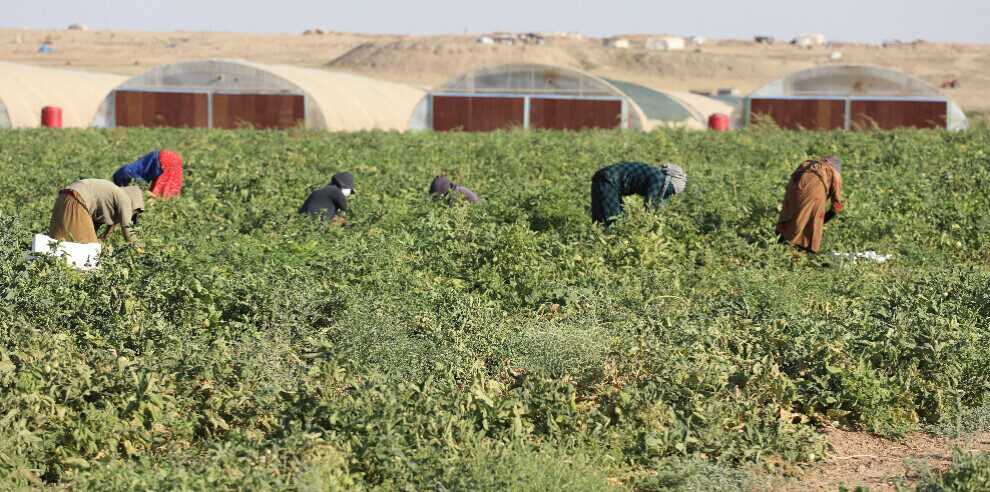The Economic Committee of the North-East Syria manages 45 thousand acres of agricultural land through cooperatives which provide income for about a thousand women.
The Economic Committee of the Autonomous Administration of North-East Syria (AANES) and the Women’s Economy affiliated with Kongra Star employ women and develop agriculture.
There are three-year-old cooperatives in North-East Syria. The Women’s Economy has launched many new projects this year. Approximately 60 women work in three cooperatives in the villages of Zihêriye, Eyn Dîwar and Teqil Beqil in Dêrik. Nearly 39 women work in a cooperative in Girkê Lege city. Two families work in a cooperative in Amûdê. 18 women from the Elî Bedran village of Tirbêspiyê and four families work in cooperatives in the Digir village. 160 women work in a cooperative in Şedade. There are also cooperatives in Til Temir and Dirbesiyê. Cooperatives not [previously] formed because of security reasons as the villages in Kobanê are close to the border, were established for the first time in 2023. Currently, the Kobanê cooperative has 5 female members. 19 families work in four cooperatives in Shehba. While 75 percent of the income of cooperatives is allocated to women working in cooperatives, 10 percent is used to fund the cooperatives. 15 percent of the income is used for new projects.
NEW PROJECTS
In North-East Syria, a new project has introduced planting of fruit trees apart from the production of wheat, cumin, chickpea, lentil, mint. In the Cizîre Region, this project is being implemented for the first time by the Women’s Economy. 4,000 Asian persimmon, fig, grape and olive trees were planted on March 1 in Derik. Every 10 trees that will bear fruit after two years will be delivered to a family that will manage them as cooperatives. In the Euphrates Region, 4,500 grape trees were planted.
Moreover, the Women’s Economy will start producing natural fertilizers from egg and fruit shells in order not to pollute the environment.
45 THOUSAND DECARES OF AGRICULTURAL LAND
Gule Murad, one of the directors of the Women’s Economy of North-East Syria, spoke to ANF. She said: “One of the founding purposes of the Economic Committee was the creation of cooperatives. Our first aim was to revive the spirit of collectivism.” Murad stated that most of the land managed by the Women’s Economy, which has 45 thousand decares of agricultural land, is in villages. She remarked: “Our land is very little in the city. Families and women living close to the land are selected for the maintenance of the land. Because those who work for a cooperative should cultivate their land properly. They should take good care of the land. Cooperatives do not require expertise. Our people living in villages are already familiar with cultivating and know about agriculture. They have a lot of experience in this sense. Also, their experience gets better over time. The main thing is that they should take care of the agricultural land.”
WHEAT PLANTING AMID WAR AND EMBARGO
Pointing out that North-East Syria has fertile soils, Murad continued: “We have fertile soils for agriculture. You can get any kind of fruit. In terms of air and water, the Cizîrê Region is more suitable for agriculture, but we also obtain efficiency in other regions. Our priority is wheat planting. There is constant war in the region. Alongside the war, the embargo also continues. Therefore, there is a lack of bread and flour. We also produce lentils, chickpeas, cumin, barley, corn, greens and plant fruit trees. There were no water wells in the lands managed by the Women’s Economy. We have not yet reached a level to finance the needs of North-East Syria. We have reached a certain level, but we cannot fully finance projects. We send the green vegetables we produce to the market for a small price. Our people are happy with it. Wheat is also delivered to warehouses.”
WATER WELLS AND SOLAR ENERGY
Murad noted that this year they started to dig water wells around the lands managed by them. She added: “The more water there is, the more developed agriculture will be. We need technical materials, but we will obtain them over time. We have also started preparations for a transition to the solar energy system because there is a problem with electricity and diesel fuel in the region. Thus, we will find solutions to our problems with the solar energy system. All these projects will be run by cooperatives.”

